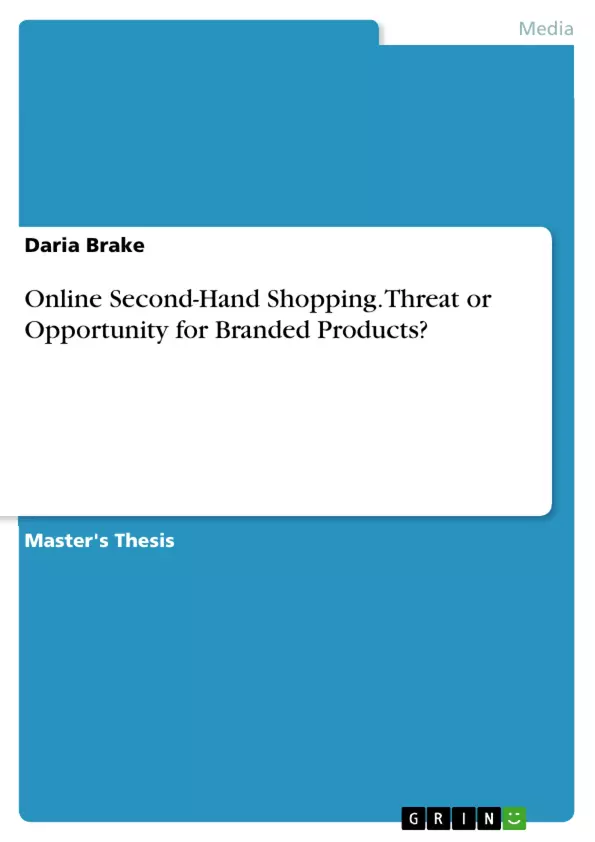The internet has provided fertile ground for turning the traditional niche activity of second-hand shopping into a mass phenomenon. Various successful consumer-to-consumer-platforms such as eBay.de facilitate the exchange of second-hand goods for both resellers and buyers, with branded products being especially popu-lar. This development has fostered concerns from brand manufacturers. They fear that second-hand offerings pose a threat to brand perceptions. However, this assumption has yet not been verified empirically and constitutes a research gap in the marketing literature. The research aim of this thesis is thus to investigate whether the degree of availability of second-hand products affects consumer brand perceptions while taking into account the possible moderator effects of product type and price. Specifically, the effects on brand image, perceived quality, and perceived prestige are examined.Our conceptual framework is based on a combination of theoretical findings relating to second-hand products, brand perceptions and limited product availability. Moreover, it is supplemented through insights from related fields such as price promotions and counterfeits. After having pre-tested the stimuli for product type and price, a final quantitative online survey was carried out that yielded a total of 561 usable responses. Due to the study’s experimental design and existence of multiple dependent variables, multivariate and univariate analysis of variance were employed to analyze the data. Our findings suggest that....
Inhaltsverzeichnis (Table of Contents)
- Introduction
- Conceptual Background
- Definition of Second-Hand Products
- Characteristics of Second-Hand Products
- Empirical Findings Related to Second-Hand Products
- Consumer Brand Perceptions
- Brand Image
- Perceived Quality
- Perceived Prestige
- Product Availability
- Theories on Scarcity Effects
- Evaluation of Scarcity Theories regarding Applicability to Research Context
- Development of Hypotheses
- Main Effect
- Moderating Effect of Product Type
- Moderating Effect of Price
- Interactive Moderating Effects of Product Type and Price
- Control Variables
- Descriptive Variables
- Conceptual Framework
- Empirical Study
- Pre-Test
- Stimuli Selection
- Pre-Test Design and Results
- Experimental Design
- Procedure
- Operationalization of Variables and Scenario Description
- Data Cleaning and Sample Characteristics
- Scale Assessment
- Statistical Technique and Testing of Assumptions
- Pre-Test
- Results
- Manipulation and Realism Check
- Testing of Hypotheses
- Discussion of Results
- Conclusion
- Summary
- Theoretical Contribution and Managerial Implications
- Limitations and Further Research
Zielsetzung und Themenschwerpunkte (Objectives and Key Themes)
This thesis investigates the impact of second-hand product availability on consumer brand perceptions. The study examines the potential threat that second-hand offerings pose to brand image, perceived quality, and perceived prestige. The research also considers the moderating effects of product type and price on these perceptions.- Impact of Second-Hand Product Availability on Brand Perceptions
- Threat of Second-Hand Offerings to Brand Image, Perceived Quality, and Prestige
- Moderating Effects of Product Type and Price
- Consumer-to-Consumer Platforms and Branded Products
- Empirical Research on Brand Perceptions and Second-Hand Products
Zusammenfassung der Kapitel (Chapter Summaries)
The thesis begins by introducing the research topic and outlining the gap in existing literature regarding the effects of second-hand product availability on brand perceptions. Chapter 2 delves into the conceptual background of the research, defining second-hand products, exploring their characteristics, and examining existing empirical findings. This chapter also analyzes consumer brand perceptions, focusing on brand image, perceived quality, and perceived prestige. It further explores the concept of product availability and investigates theories on scarcity effects. Chapter 3 outlines the hypotheses that will be tested in the study, including the main effects of second-hand product availability, the moderating effects of product type and price, and the potential interactive effects of these variables. The chapter concludes with a detailed description of the conceptual framework that guides the research. Chapter 4 details the empirical study, including the pre-test used to select stimuli and the design of the online survey. The chapter also discusses the procedure of the study, operationalization of variables, data cleaning, sample characteristics, scale assessment, and the statistical techniques used to analyze the data. Chapter 5 presents the results of the study, focusing on the manipulation and realism check, the testing of hypotheses, and a discussion of the findings.
Schlüsselwörter (Keywords)
The primary focus of this thesis is on the intersection of consumer behavior, brand management, and the online marketplace. The research explores the impact of second-hand product availability on brand image, perceived quality, and perceived prestige. It examines consumer-to-consumer platforms, specifically eBay.de, and their role in facilitating the trade of branded products. This study utilizes empirical research to investigate the potential threat of second-hand offerings to brand perceptions and to analyze the moderating effects of product type and price. Key concepts include consumer brand perceptions, second-hand products, scarcity effects, and online marketplaces.Frequently Asked Questions
Does second-hand availability harm brand prestige?
This thesis investigates whether the wide availability of used products on platforms like eBay negatively affects how consumers perceive a brand's prestige and quality.
What are the main brand perceptions examined in this study?
The research focuses on three key dimensions: brand image, perceived quality, and perceived prestige.
How do price and product type moderate brand perception?
The study analyzes if the impact of second-hand offers varies depending on whether the product is a luxury or mass-market item, and its price level.
What theories are used to explain these effects?
The conceptual framework is based on theories of scarcity, limited product availability, and findings from research on counterfeits and price promotions.
Is there a research gap regarding second-hand branded goods?
Yes, while manufacturers fear threats to their brand, empirical verification of these effects in the context of C2C platforms was previously lacking.
What was the methodology of the empirical study?
A quantitative online survey with 561 participants was conducted using an experimental design and analysis of variance (ANOVA).
- Quote paper
- Daria Brake (Author), 2014, Online Second-Hand Shopping. Threat or Opportunity for Branded Products?, Munich, GRIN Verlag, https://www.grin.com/document/278444



